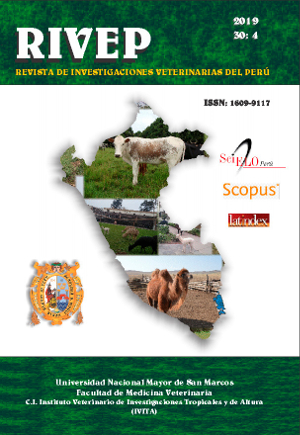Effect of protein and energy supplementation on milk yield, density, total solids, fat and milk urea nitrogen in Brown Swiss cows under natural hypobaric conditions
DOI:
https://doi.org/10.15381/rivep.v30i4.17168Keywords:
dairy cows, feed ration, energy-protein ratio, milk composition, MUNAbstract
This study aimed to determine the effect of the energy / protein ratio of supplementary feed rations (RAS) on the production and characteristics of milk under natural hypobaric conditions (4300 m altitude in Puno, Peru). A total of 24 Brown Swiss cows in first and second third of lactation were distributed in three RAS with three ratios of metabolizable energy / protein (RAS1: 17.0 kcal/g; RAS2: 14.2 kcal/g; RAS3: 12.4 kcal/g) and as a protein source three levels of hydrolysed sheep and alpaca skins – Pioval-2® (0, 3 and 6%, respectively) and three levels of extruded whole soymeal (0, 10 and 25%, respectively). The cows were grazing on alfalfa associated with rye grass and supplemented with oat silage. Daily milk yield (DMY) was recorded for 45 days, as well as density (DE), total solids (TS), fat (FA) and milk urea nitrogen (MUN) at 0, 15, 30 and 45 days. The RAS did not affect the DMY (17.7, 18.8 and 19.0 kg/day) or the DE (1,031, 1,031 and 1,030 g/l, respectively) of the milk. RAS2 increased the TS and FA (13.0%, 4.2%) in relation to RAS1 (12.4%, 3.8%) and RAS3: 12.2%, 3.9%) (p <0.01) in milk, respectively. The decrease of the energy / protein fraction in the rations increased proportionally the MUN (RAS1: 28.9; RAS2: 32.3; RAS3: 36.8 mg/dl; p<0.001). In conclusion, the increase in the energy / protein fraction of the concentrate ration did not affect milk yield or milk density but improved the total solids and fat content; while the reduction of the energy / protein ratio in the ration consistently increased the urea nitrogen in the milk.
Downloads
Downloads
Published
Issue
Section
License
Copyright (c) 2020 Berly Cahuascanco-Quispe, Francisco H. Rodríguez-Huanca, Marcelino J. Araníbar

This work is licensed under a Creative Commons Attribution-NonCommercial-ShareAlike 4.0 International License.
AUTHORS RETAIN THEIR RIGHTS:
a. Authors retain their trade mark rights and patent, and also on any process or procedure described in the article.
b. Authors retain their right to share, copy, distribute, perform and publicly communicate their article (eg, to place their article in an institutional repository or publish it in a book), with an acknowledgment of its initial publication in the Revista de Investigaciones Veterinarias del Perú (RIVEP).
c. Authors retain theirs right to make a subsequent publication of their work, to use the article or any part thereof (eg a compilation of his papers, lecture notes, thesis, or a book), always indicating the source of publication (the originator of the work, journal, volume, number and date).










